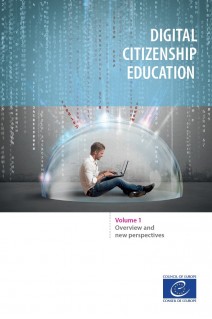



Supporting children and young people to participate safely, effectively, critically and responsibly in a world filled with social media and digital technologies is a priority for educators the world over.
Most young people in Europe today were born and have grown up in the digital era. Education authorities have the duty to ensure that these digital citizens are fully aware of the norms of appropriate behaviour when using constantly evolving technology and participating in digital life.
Despite worldwide efforts to address such issues, there is a clear need for education authorities to take the lead on digital citizenship education and integrate it into school curricula. In 2016, the Education Department of the Council of Europe began work to develop new policy orientations and strategies to help educators face these new challenges and to empower young people by helping them to acquire the competences they need to participate actively and responsibly in digital society.
This volume, the first in a Digital Citizenship Education series, reviews the existing academic and policy literature on digital citizenship education, highlighting definitions, actors and stakeholders, competence frameworks, practices, emerging trends and challenges. The inclusion of a wide selection of sources is intended to ensure sufficient coverage of what is an emergent topic that has yet to gain a strong foothold in either education or academic literature, but has received wider policy attention.
FOREWORD
EXECUTIVE SUMMARY
INTRODUCTION
CHAPTER 1 – DIGITAL CITIZENSHIP: ANALYSING DEFINITIONS, ACTORS AND FRAMEWORKS
1.1. Definitions
1.2. Actors and frameworks
1.3. Conclusions
CHAPTER 2 – DIFFERING PERSPECTIVES
2.1. The role of industry in digital citizenship education
CHAPTER 3 – PRACTICES
3.1. Conceptualising “good” practices into “sense-making” practices
3.2. Methodological conundrums
3.3. Strengths and weaknesses
3.4. The scope: engagement and motivation
3.5. Documentation as dissemination
3.6 The competences disconnect
3.7. The funding/evaluation catch-22
3.8. The governance gap
3.9. Conclusions
CHAPTER 4 – EMERGING TRENDS
4.1. Added values: empathy, life skills and social literacies
4.2. Trends in the practices analysed in the “Digital citizenship education multi-stakeholder consultation report”
4.3. Trends in new teaching and learning theories and practices that may affect digital citizenship education
CHAPTER 5 – CHALLENGES
5.1. Organising and piloting descriptors for digital citizenship education
5.2. Consider online and offline as a whole
5.3. Digital citizenship education should start at an early age
5.4. Getting access to the huge number of experiences across Europe
5.5. Various forms of participation
5.6. Hard literacies are striking back: finding a comprehensive approach towards hard sciences and life (soft) sciences
CHAPTER 6 – CONCLUSIONS
Recommendations
REFERENCES
APPENDIX 1 – COMPARATIVE ANALYSIS OF MULTINATIONAL FRAMEWORKS FOR DIGITAL CITIZENSHIP EDUCATION
APPENDIX 2 – COMPARATIVE ANALYSIS OF NATIONAL FRAMEWORKS FOR DIGITAL CITIZENSHIP EDUCATION
APPENDIX 3 – TOOL FOR ANALYSIS OF SENSE-MAKING PRACTICES IN DIGITAL CITIZENSHIP EDUCATION
Download an extract (1000)





Supporting children and young people to participate safely, effectively, critically and responsibly in a world filled with social media and digital technologies is a priority for educators the world over.
Most young people in Europe today were born and have grown up in the digital era. Education authorities have the duty to ensure that these digital citizens are fully aware of the norms of appropriate behaviour when using constantly evolving technology and participating in digital life.
Despite worldwide efforts to address such issues, there is a clear need for education authorities to take the lead on digital citizenship education and integrate it into school curricula. In 2016, the Education Department of the Council of Europe began work to develop new policy orientations and strategies to help educators face these new challenges and to empower young people by helping them to acquire the competences they need to participate actively and responsibly in digital society.
This volume, the first in a Digital Citizenship Education series, reviews the existing academic and policy literature on digital citizenship education, highlighting definitions, actors and stakeholders, competence frameworks, practices, emerging trends and challenges. The inclusion of a wide selection of sources is intended to ensure sufficient coverage of what is an emergent topic that has yet to gain a strong foothold in either education or academic literature, but has received wider policy attention.
Please note that in accordance with our terms & conditions, PDF/epubs may only be purchased by private individuals.
